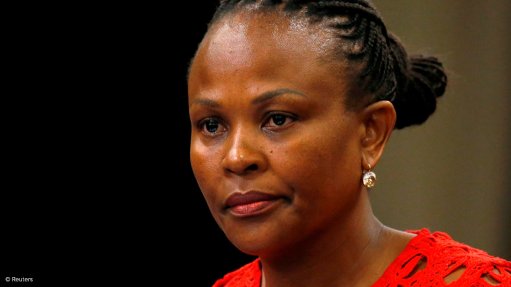
Public Protector Busisiwe Mkhwebane
Photo by: Reuters
The Democratic Alliance (DA) said on Tuesday that it would call for the removal of Public Protector (PP) Busisiwe Mkhwebane.
In a statement, DA MP Glynnis Breytenbach cited an affidavit by the South African Reserve Bank (Sarb) in which it questions Mkhwebane’s independence after she allegedly discussed her “remedial action” to change the mandate of the Sarb with the Presidency’s legal advisers and the State Security Agency, without giving other parties like the central bank a right to reply.
“This information has been revealed in annexures to the supplementary affidavit filed by the South African Reserve Bank (Sarb) and clearly demonstrates that Mkhebane does not operate in an impartial manner but rather seems to take her orders from the Union Buildings,” Breytenbach said.
“The DA will, therefore, write to the Speaker of the National Assembly, Baleka Mbete, to request that this matter is dealt with by the relevant Portfolio Committee, in terms of Rule 337 and 338 of the National Assembly Rules.”
The Constitution clearly sets out the conditions that have to be met before a PP can be removed from office by the President. These include that a relevant committee of Parliament should conduct an inquiry and only after a finding of “misconduct, incapacity or incompetence” is proven could a resolution be put before the National Assembly where a two thirds majority has to approve it.
In August, the high court in Pretoria set aside Mkhwebane’s recommendation calling on Parliament to amend the Constitution and change the mandate for the Sarb.
In a supplementary affidavit, released on Tuesday, the Sarb questions Mkhwebane’s independence, citing her meetings with President Jacob Zuma’s legal advisers and the State Security Agency before she released her final report. The Sarb said while the President was allowed to comment on the final report, which included the highly criticised recommendation, no other parties, including the central bank, were afforded this opportunity.